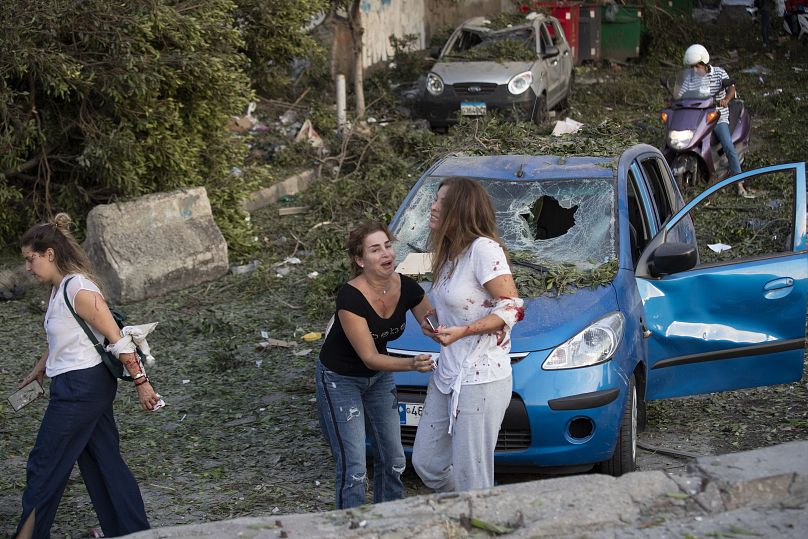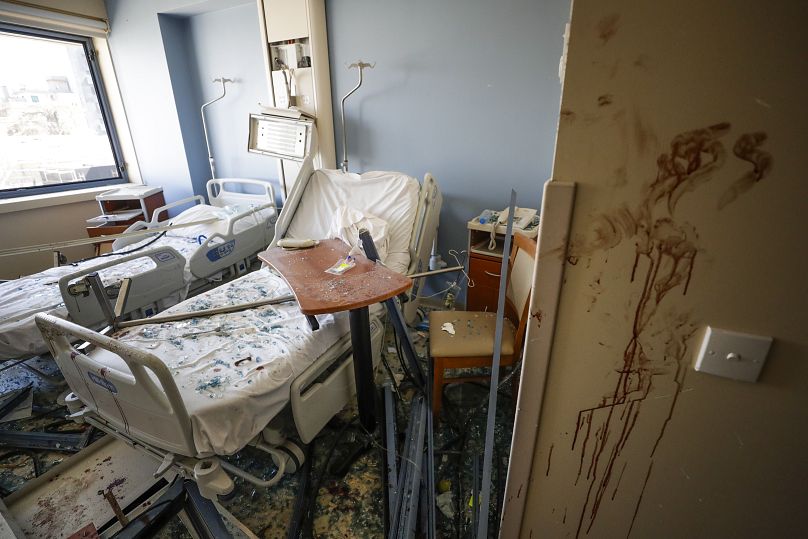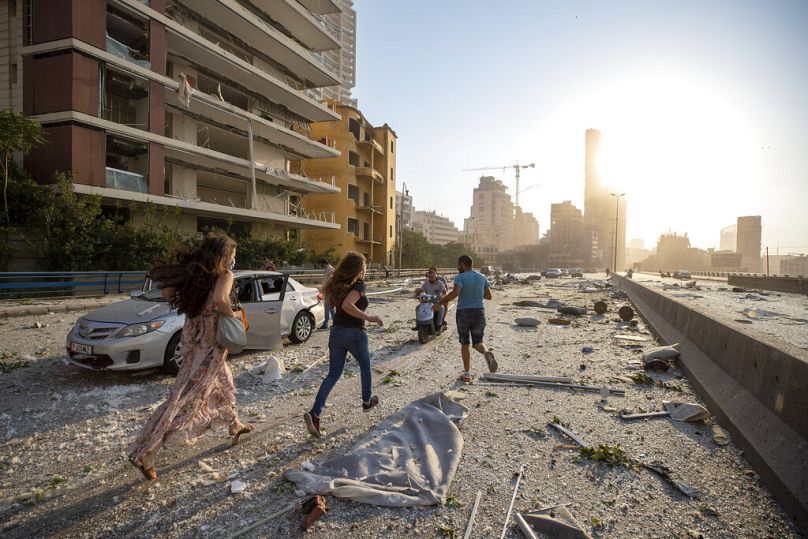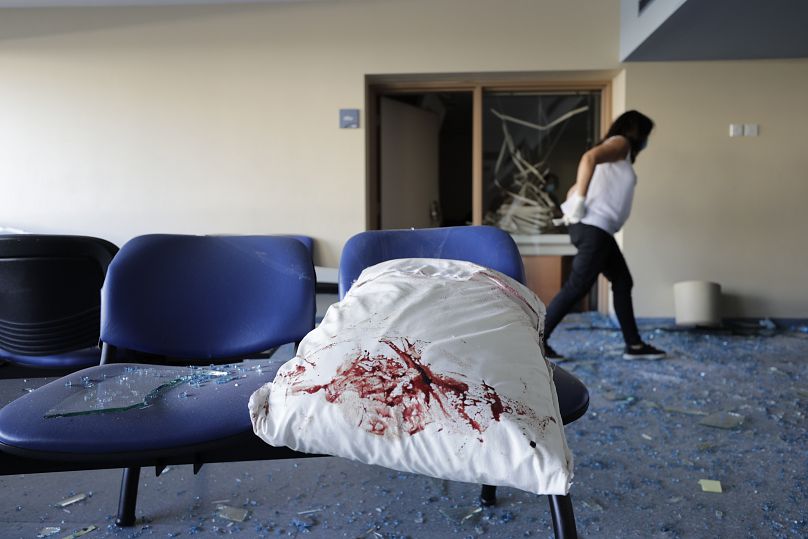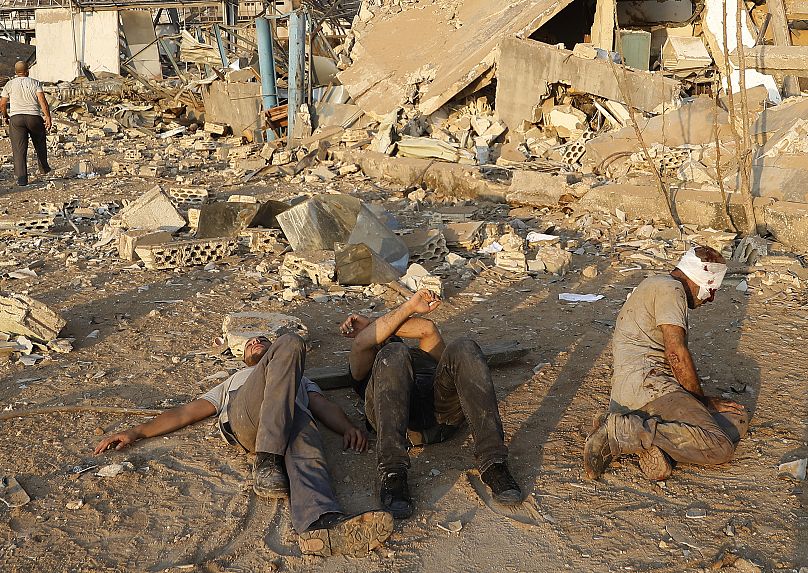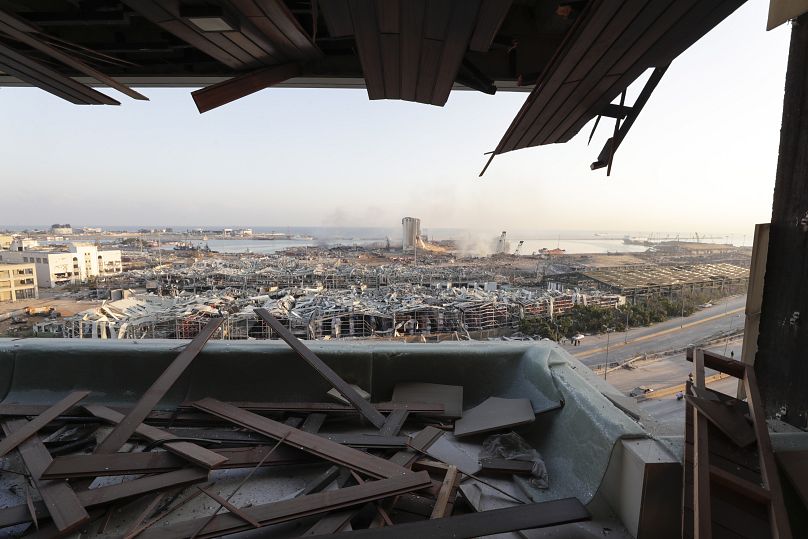From moment the explosions hit to the trauma felt the morning after, this timeline shows the human cost of Tuesday's events in Beirut.
Beirut's population awoke on Wednesday to their city partly levelled by widespread destruction, piling further pressure on an already strained situation in the midst of an economic crisis and pandemic.
The whole of Lebanon's capital, often dubbed the Paris of the Middle East, was affected by Tuesday's twin explosions that struck with the strength of a 3.5-magnitude earthquake and were felt as far as Cyprus.
But it was the personal accounts on the ground that painted a truly grave timeline of the unfolding situation.
'The biggest explosion I've ever seen'
"I was at home, sitting on my desk, I had made fresh coffee and opened my laptop," journalist Luna Safwan wrote as she recalled the moment of the blasts.
"I felt my ears close, suddenly I felt as if a plane was over my house, my desk shook, I ran to tell my dad that there's an explosion, a second explosion happened at that moment.
"It took me less than 3 seconds, I was trying to explain to dad (on my left) that there's an explosion and that we need to move, I turned right, the second explosion happened, my mom and I flew across the room and all the doors were suddenly opened."
Explosions are not a completely foreign experience for many people in Lebanon, who can vividly remember more than a decade of civil war from 1975 to 1990, and, more recently, the 2006 conflict killed more than a thousand people.
But for some on Tuesday, even these memories were engulfed by the explosions that rocked the capital.
Mahmoud Ramsey, an economist, said the blasts were the "biggest" he had ever seen, despite living through the bombing that killed former Lebanese Prime Minister Rafik Hariri in 2005, and the conflict with Israel the following year.
He added: "The streets are lined with people covered in blood from all the falling glass."
Ghadi Sary had a similar recollection. He said: "Massive bomb in Beirut, sucked the air out, massive red cloud, strongest I’ve seen in my whole career, and life."
British-Lebanese writer Nasri Attallah said he had feared his father was dead after hearing the news, but had later discovered he had been driven away after walking around "shell-shocked" when the explosions hit.
"I thought I was going to lose my 79-year-old father yesterday," he said.
"When he eventually made it home, he spent the night telling us how the building disintegrated around him. How the glass face of it collapsed, how the roof collapsed just in front and just behind him.
"How he doesn't understand how he got out alive. How people kept guiding him through the mayhem until he was safe.
"People terrified and injured who guided him back to us. Everyone I know is traumatised. None of us have processed it yet. Can the human heart survive processing this?"
People 'piled on the floor' of hospitals
Lebanon's health system had already been experiencing significant stress prior to Tuesday's blasts, balancing a delicate situation between dire financial circumstances that have been further impacted by the COVID-19 outbreak.
As news of the incident in Beirut's port area began to break, doctors across the city spoke out about their anxiety at the night ahead.
Neurosurgery resident Fred Bteich anticipated a "very long night at the ER. A very long one".
He said: "Patients are literally piled up on the floor. Going up to lend a hand.
"And coronavirus, don't get hold of us tonight. Take a break from Lebanon, just for this night."
Firass Abiad, also a surgeon, said the emergency department at his hospital was "very busy" as one person had died and dozens more had been admitted.
"More to come, we are informed," he wrote. "Most have glass injury, some deep. Received evacuated patients from Karantina Hospital. Proud of the staff, everyone reported to duty."
According to AFP, some hospitals were forced to turn patients away due to damaged infrastructure, or simply being too overwhelmed with admissions.
Doctors in at least one hospital were reportedly forced to treat patients in the car park outside.
READ MORE | Over 100 dead as rescuers battle with Lebanon's 'national disaster'
By 4am, Bteich said the night had been "full of terrors" as he couldn't erase the memory of "war-like scenes" he had witnessed while treating his patients.
He added: "Our generation never saw this coming. We operated on many people tonight, some of whom we couldn’t find any relative for, or couldn’t even identify by name.
"Some were figuratively dead, but we gave them a chance nevertheless. Because after all, who knows?
"Children, young people, adults...Lebanese/non-Lebanese...Hearing of casualties among the medical staff of another nearby hospital.
"My heart aches tonight."
READ MORE | Countries offer help for Lebanon's devastated capital
Meanwhile, Abiad said at least nine people had since passed away at his hospital — four of whom had still not been identified.
There were also a further 180 injured people treated at the facility, with Abiad estimating: "More casualties will come."
He said: "This will be a difficult night. My thoughts are with the families of people who have passed away or still missing.
"The scenes in the ED are devastating, but the staff are kind and selfless. No more words."
READ MORE | 'It's a disaster in every sense of the word', says minister, as dozens die
Psychology resident Ramez Dagher said he had "never seen as much tragedy in my life" than what he saw in his emergency department.
"No words can ever be enough to describe the pain. Pain, blood, doom, gloom and despair," he said.
"What have the people done to deserve this? When did we become so powerless? How did it come to this? How? How?"
A similar account came from Ihab Ibrahim, a pulmonary and critical care specialist, who recalled "literally working among the bodies" as more and more admissions arrived.
"I am currently unable to comment," he added.
'I have lost everything'
The losses across the city are huge. More than a hundred people have been killed — a number expected to rise — and thousands have been injured.
On top of this, Beirut governor Marwan Abboud estimated that up to 300,000 people had now lost their homes.
"I just lost everything," Amnesty International employee Joelle Bassoul wrote on Twitter as she shared pictures of the destruction around her.
"My home is gone."
Social media has since been filled with posts from Beirut residents opening their homes and sharing phone numbers of those with spare rooms to ensure people are not left without a place for the night.
Associated Press correspondent Sarah el-Deeb said she was one of those who had been rendered homeless, but that her friends had been able to offer a spare bed.
'I woke up crying'
The following morning, talk had turned to the many loved ones who had failed to get in contact with their friends and family — resulting in numerous panicked posts on Twitter and Facebook looking for information.
Rescue teams are still working to pull survivors from underneath the rubble of several buildings that were levelled in the immediate vicinity of the explosions.
And hospitals, too, are still working to identify some of their patients.
There is currently no official tally for the missing; however, several pages have been set up to help spread pictures and information of those who are yet to be found.
A Google document currently lists more than 80 names, while an Instagram account dedicated to the missing has also posted nearly 100.
Others reported waking up on Wednesday morning and bursting into tears after remembering the events of the day before, while some said the trauma had stopped them from sleeping at all.
"I can’t remember the last time I stayed awake all night like that, traumatised, alert, shaken, hurting," said journalist Dalal Mawad.
"People I know are dead, injured. The devastation is indescribable. Beirut is broken."
Carol Malouf Khattab, another journalist, said: "Woke up crying, broken and deeply wounded just like our beautiful city."
Meanwhile, Nasri Atallah, the British-Lebanese writer, said he had been "breaking down every hour" for 12 hours straight, before eventually getting to sleep.
He said: "Dozens are dead, thousands are injured. The city is destroyed. How much sadness can one country take? [...]
"I was nowhere near the explosion yesterday and I woke up at 6am from a nightmare where I was being showered in shards of glass.
"Beyond material support, everyone in this city will need kindness and therapy.
"This is one trauma too many."












